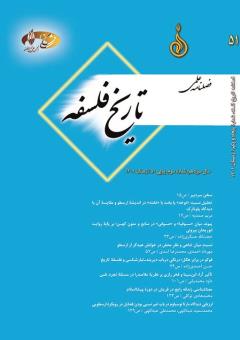نسبتِ میان تناهی و نظرِ محض در خوانش هیدگر از ارسطو
محورهای موضوعی : ریشهشناسی مکاتب و آراء فلسفی در ادوار قدیم و جدیدمهرداد احمدی 1 , محمدرضا اسدی 2
1 - دانشجوی دکتری فلسفه، دانشگاه علامه طباطبائی، تهران، ایران
2 - دانشیار گروه فلسفه، دانشگاه علامه طباطبائی، تهران، ایران
کلید واژه: تناهی, تئوری, حقیقت, ارسطو, هیدگر.,
چکیده مقاله :
از دیدگاه ارسطو فعالیت نظری و تئوریک، فعالیتی بیمیل و بیجهان است که از هر امر منفی و مقاومی پیشی میگیرد و درنتیجه بسبب طرد شدن تناهی، خطا به آن راه پیدا نميكند. همین معنا خودآیینی ویژه يي را برای تئوری بهارمغان میآورد، یعنی ناظر در نظر محض درمی یابد که در میانة فعالیت تئوریک، نه تنها هیچ انفعالی بر او اثر نمیگذارد بلکه حتی هیچ امکان خطایی در فعالیت نظری محض وجود ندارد. اما نکتۀ اساسی تمام این نتایج اینست که از نظر هیدگر، ارسطو بدون تحول در فهم وجود و گذار به ساحت پوئزیس (هنرورزی/ شعر)، نميتوانست چنین جایگاهی را برای انسان در مقام تئوری، فراهم نماید. از دیدگاه هیدگر، افق جوهرشناختی (اوسیالوژیک) وجود ناشی از تحولی است که در فهم یونانیان از وجود رخ داده و بتبع این تحول، تناهی ساختاری ظهور وجود و موضعِ متناهی ناظر در میان موجودات، امکان برآیش معرفت مطلق را دستکم برای یک موجود، یعنی ثئوس یا موجود الوهی، فراهم کرده است. بهمين دليل مقاله حاضر میکوشد نشان دهد که چگونه بواسطة جوهرشناسی ارسطو، دانایی بمثابه نظر کردن، به میل شایستة هر انسانی بدل شده و امکانی برای گذار از تناهیِ ذاتی نظر ظهور ميكند.
In Aristotle’s view, theoretical activity is an emotion-free and worldless activity that leaves all negative and resisting affairs behind. As a result, because of the falsity of finitude, error has no way into theoretical activity. Accordingly, theory enjoys a specific kind of autonomy, in other words, an individual involved in pure theorizing perceives that in the course of theoretical activity he is immune to not only any emotion but also to any error in his purely theoretical activities. However, the essential point here is that in Heidegger’s view, Aristotle could never provide such a status for Man at the level of theory without undergoing a change in his understanding of existence and moving to the realm of poiesis. According to Heidegger, the horizon of ousiology of existence is the result of a transformation in the Greeks’ understanding of existence. As a result, the structural finitude of the emergence of existence and the finite position of the theoretician among existents enable him the develop an absolute knowledge of at least one existent, that is, theos or existing God. Therefore, the present paper aims to demonstrate how, based on Aristotle’s ousiology, knowledge in the sense of theorizing has turned into a deserving desire for all human beings and has emerged as a possibility for transcending the essential finitude of theory.
Aristotle(1997). Metaphysics. W.D.Ross. Cambridge university press: Cambridge
Aristotle(1994). Nicomachean Ethics. W.D.Ross. Cambridge university press: Cambridge
Heidegger, Martin(1998). Pathmarks. William McNeil. Cambirdge university press: Cambridge
Heidegger, Martin(1997). Plato's sophist. Richard Rojcewicz & Andre Schuwer. Indiana university press:Indianapolis
Heidegger, Martin(2010). Logic :the Question of Truth. Thoms Sheehan. Indiana university press:Indianapolis
Heidegger, Martin(1995). Aristotle's Metaphysics θ1-3. Walter Brogan & Peter Warnek. Inidana university press: Indianapolis
McNeil, William(1999). The Glance of the Eye. State university of newyork press:newyork
Marx, Werner(1971). Heidegger and the Tradition . Theodore Kisiel. Northwestern university press: Evanston


